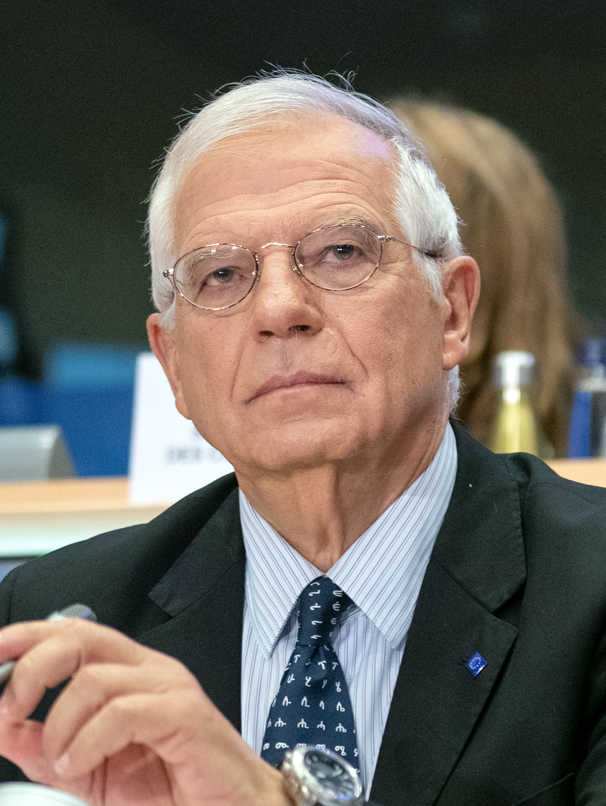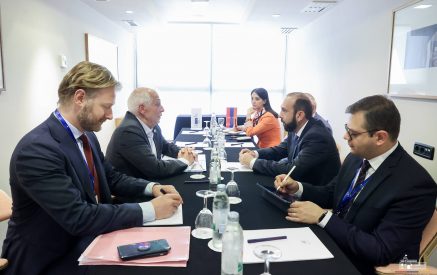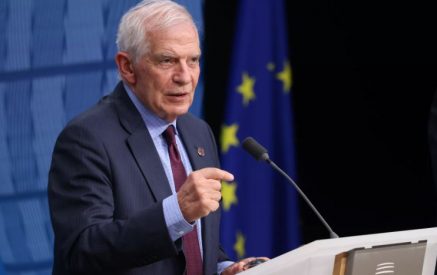Foreign Affairs Council: Remarks by High Representative/Vice-President Josep Borrell at the press conference
Thank you.
Today we had a very intense Foreign Affairs Council, but I am happy. I am satisfied, because we managed to advance on a number of key points.
First, we had a long list of points under current affairs: Sahel, Western Balkans, the humanitarian tragedy in Idlib in Northwest Syria and Venezuela. I debriefed [Foreign Affairs] Ministers on my visits to Iran and Jordan, as well as to Washington.
Read also
We had an exchange of views about the Middle East Peace Process under current affairs; it was not on the agenda as a specific point. Following the presentation of the United States’ proposal, we briefly discussed how best to relaunch a political process that is acceptable to both parties and how to best defend the internationally agreed parameters, equal rights and international law. Several ministers requested that this should be a point in the agenda on the next Foreign Affairs Council, with a specific discussion about and with some resolutions. We will do it after the Israeli elections.
We also discussed the priorities for our relationship with Africa. This year is going to be full of many important events: the European Commission meeting together with the African Union in less than two weeks, the ministerial meeting with the African Union in Kigali in May, and finally the European Union – African Union Summit in October. So, Commission to Commission, Ministerial meeting and the Summit in October.
As High Representative, together with my colleagues from the [European] Commission, I will present on the 4th of March a contribution in the form of a joint communication, which will be the starting point of a process that will end at the October Summit. During this period, we will use all opportunities to seek the views of our African partners about what their interests and priorities to make this a strategy not about Africa, but an strategy for Africa together with Africa. It means that we are going to reach out to many actors in several meetings at different levels. From the European Council in June to the Summit in October, we will have time to discuss in order to have something that can really be called a strategy with Africa.
Finally, during my visit to India in January to attend the Raisina Dialogue, I invited the Minister of External Affairs [Subrahmanyam Jaishankar, Minister of External Affairs of India] to the [Foreign Affairs] Council as a way to enhance our relations with an important strategic partner and to prepare the upcoming Summit, scheduled for the 13th of March. I am very happy that he followed up on this invitation so quickly and joined us for the informal lunch. We had a fruitful discussion with many questions to the Minister. The meeting was very fruitful.
But the most important issue that we have discussed today is Libya. The German Minister [of Foreign Affairs] Heiko Maas debriefed the colleagues of the [Foreign Affairs] Council on the outcome of yesterday’s follow up meeting on the Berlin process we had on the margins of the Munich Security Conference.
There was a strong call for the arms embargo to be fully respected and implemented. We know that it is not the case. The arms embargo is violated systematically and it is going to feed the fighters with an incredible amount of arms that make the ceasefire difficult and the truce very weak.
The Ministers agreed that we, as European Union, can play a role and I am happy to announce that after a very long discussion – one of the longest and more intense discussions I can remember -, we managed to reach a political agreement that this morning before starting the [Foreign Affairs] Council I really thought would be impossible. But it is proof that when there is political will, nothing is impossible. Let me go through the main lines of this political agreement that will have to be [made more] concrete at the next Foreign Affairs Council.
We agreed to launch a new operation in the Mediterranean sea and Operation Sophia will be closed. Operation Sophia reaches its end on the 31st of March and on that day Operation Sophia will finish. We are going to launch a new operation in the Mediterranean. We agreed that this operation will have as a goal the implementation of the arms embargo imposed by the United Nations Security Council. The operation will comprise aerial, satellite and maritime assets. Not only maritime assets, satellite and aerial, the warships themselves will serve as the basis for the radar control of their space.
The aerial operation will be defined in accordance with the agreed mandate. It means that it is not going to be the same area of operation than the one of [Operation] Sophia. [Operation] Sophia was covering the whole Libyan coast, from one side to the other, from one border to the other border of the country. If we want to control the arms embargo, we have to concentrate our surveillance on the Eastern part, where the arms are coming from and a strategic situation with respect to the routes followed by the ships bringing arms to Libya. But the military staff will define the area of operation according with this mandate. We agreed that it will maintain other supporting and secondary tasks, including as regards fighting organised crime responsible for migration and also continue training the Libyan Coast Guard and Navy.
We have noted legitimate concerns of some Member States regarding potential impact on migration flows – the so-called pull effect -, and indicated that this will be monitored carefully and reported on regularly by the Operation Commander.
On this basis, in case of observation of pull factors on migration, maritime assets will be withdrawn from the relevant areas. In case there is a pull effect, and there are different opinions about it, some believe that this pull factor will appear, others believe that on the Eastern part it is not going to happen because the migration routes go from the centre to the West, but let us see what happens. In case that this pull factor appears, maritime assets will be withdrawn from the relevant area.
From here, from today until the next Foreign Affairs Council, the Political and Security Committee and COREPER [Committee of the Permanent Representatives] will develop all the necessary arrangements and details for the implementation of this political agreement. The Member States that need to go through a parliamentarian procedure – this is the case, for example, of Sweden and Germany – will have time to do so.
Now, we have to move speedily to elaborate and adopt a Council Decision along these lines. For sure, subject to national procedures in Member States. This has been agreed by unanimity. That is why I am so satisfied, because really at 9 o’clock in the morning I was not sure that it could be agreed. That is good news and it represents a strong commitment from the European Union to implement the arms embargo.
European Union




















































